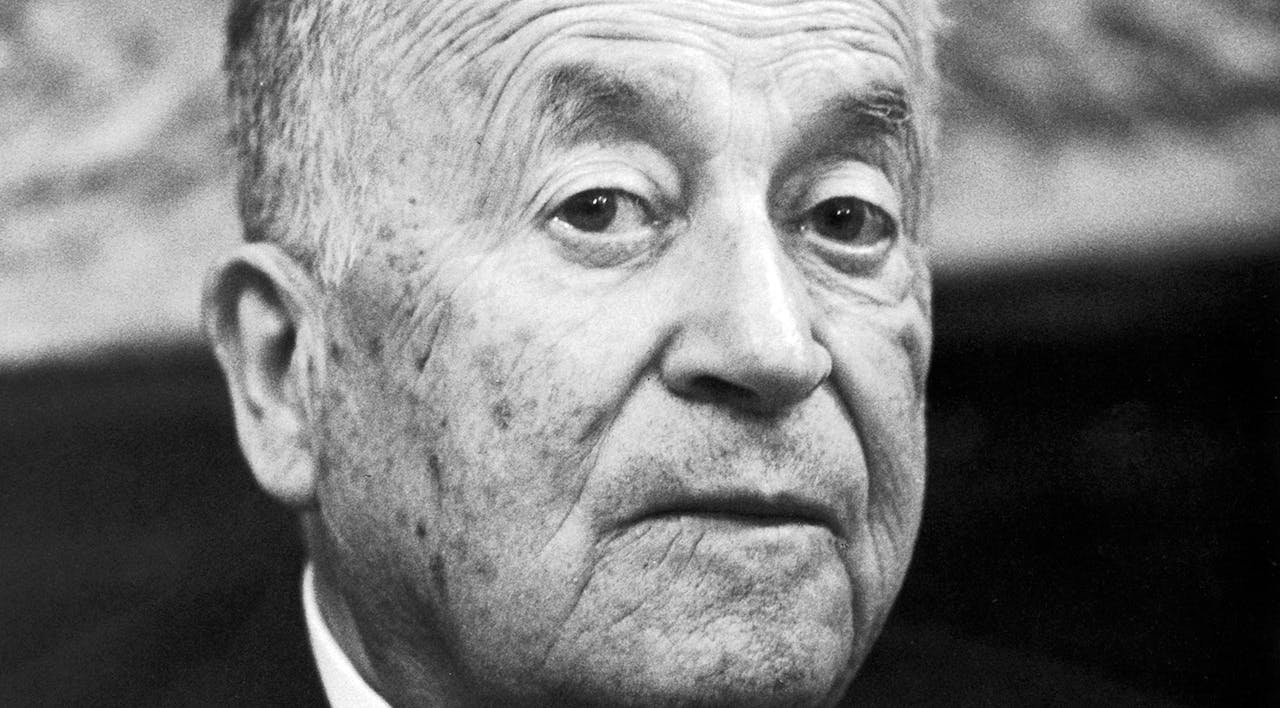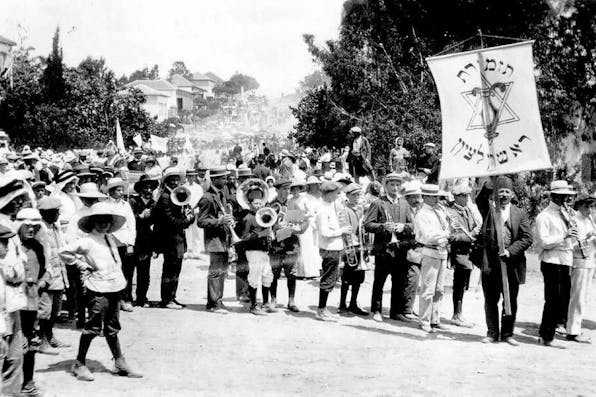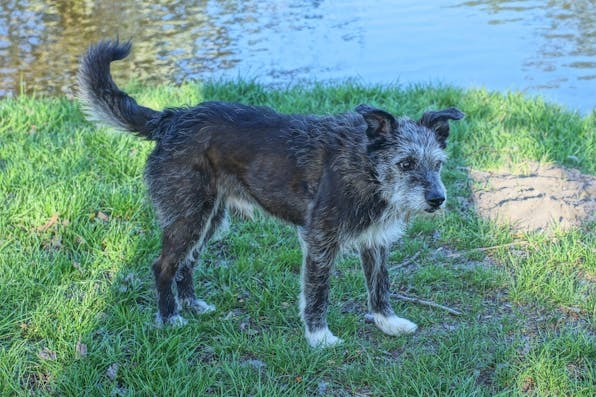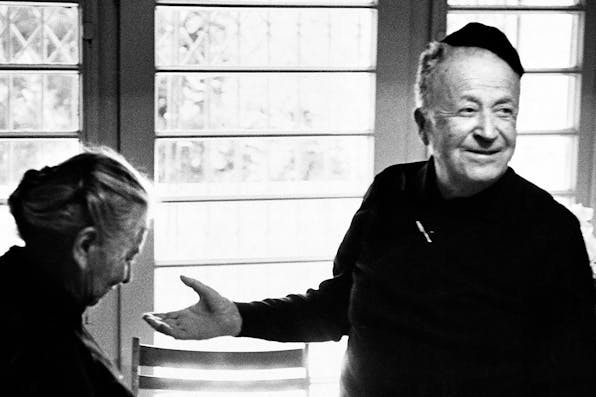
December 2018
The Matchless Master of Modern Hebrew Literature
In his fiction, and especially in the novel Only Yesterday, S.Y. Agnon casts an ironic, unfooled eye on the inner lives of his fellow Jews and their lopsided bargains with modernity.
This is the tenth and final essay in a series by Hillel Halkin on seminal Hebrew writers of the 19th and early-20th centuries. The preceding nine essays have dealt with the novelists Joseph Perl, Avraham Mapu, Peretz Smolenskin, and Yosef Ḥayyim Brenner, the poets Yehudah Leib Gordon, Ḥayyim Naḥman Bialik, and Raḥél Bluvshtayn, the essayists and Zionist thinkers Ahad Ha’am and A.D. Gordon, and the writer, journalist, and intellectual Micha Yosef Berdichevsky.
I. A Taste of Agnon
Yakov Malkov was a Ḥabad Ḥasid and a bit of a writer. A day on which an article of his appeared in the newspaper Ḥavatselet was a red-letter day for him, since having readers made him feel he was doing some good in the world. Because he had a sensitive throat, he had chosen to live in Jaffa rather than in Hebron or Jerusalem, the sea being a physic for throat conditions—and because a man must provide for his family, and Jaffa was not one of the Land of Israel’s holy cities whose faithful received charity from abroad, he had opened a boarding house. In it were three rooms: a dining room, a sleeping room, and a room for his family. In summertime, when vacationers came from Jerusalem to bathe in the sea, he spread a mat in the backyard, moved his family to it, and rented out the third room, too.
——————————
At sundown, the boarders returned from their work covered with dust, sand, and plaster and put away their tools. One went to wash his hands and face; a second to wet his throat with a glass of soda; a third to see if there was mail for him on the window sill; a fourth to glance at the day’s Ḥavatselet. One noticed that the author Yosef Ḥayyim Brenner was there and hurried to greet him. Brenner shook his hand warmly like a man who would like to give a friend a gift and has only his own warmth to give.
“You should get yourself a glass of tea,” he said.
“I will, I will,” said Brenner’s greeter excitedly, as if made suddenly aware of what he had been missing all along. “I’ll go get some tea right away.”
But he didn’t. Having run into Brenner, it was hard to part with him.
Malkov donned his long, heavy gabardine that came to his feet and put on the special hat that he wore to synagogue and other such occasions. “If you people were in the habit of praying,” he said, “we could have a minyan here. Since we’re not that fortunate, you’ll excuse me for being off to evening prayers.”
Glad for the chance to be with Brenner, we told him, “Pray for us, too, Reb Yakov.”
Malkov turned to look at us. “You can pray for yourselves,” he said.
——————————
Malkov strode in briskly and called cheerfully, “Good evening, lads! A good evening to you all!” He took off his gabardine, hung it on a peg, doffed his hat, and gave it a loving pat. Seeing his wife standing and talking in the dining room, he scolded, “A person might think you were a rabbi giving a sermon. Back to the kitchen, woman, and tend to your affairs! Yosef Ḥayyim, you’ll have a bite to eat with us.”
“I’m afraid not,” Brenner said.
“Don’t tell me that woman has scared you into thinking there’s nothing to eat here,” said Malkov. “All the fancy dishes she ate at her parents’ made her think no other fare is fit for a Jew. Sit down, brother, have a seat and dig in. Ḥemdat, here’s a piece of fish for you. At the feasts in the World to Come, you’ll long for the tail end of its tail. Mapku, you’re a regular here: go ask Azulai for a few dozen eggs.” (Mapku was Gurishkin, called that by Malkov because he wrote fiction like Avraham Mapu.)
“Sit down, brother, have a seat and dig in. Here’s a piece of fish for you. At the feasts in the World to Come, you’ll long for the tail end of its tail.”
“I’ll go, Reb Yakov,” said little Yankele.
“You stay here,” Malkov said. “You’re a kohen and I don’t send priests on errands, especially if they can’t even say kaddish for their own father. Don’t you think he’s worth at least one kaddish? You’ll come to synagogue with me tomorrow and say it. I knew this fellow’s father, may he rest in peace,” he said to Brenner. “He served God and country. He farmed land in Hadera and caught yellow fever, but he wouldn’t leave it even when he was sick. He said, ‘It’s leaving the Land of Israel that kills a man, not yellow fever.’ When he was dying he pointed to outside the window and said, ‘Great is our shame, for we have forsaken the land.’ Polishkin, put down that Ḥavatselet! If you’re looking for something to laugh at, try one of Eliezer Ben-Yehudah’s rags. Or are you afraid that heathen’s clowning will rub off on you? Yosef Ḥayyim, you’re new in this country. You don’t know how wise its wise men are. Listen to a penny’s worth of their wisdom.”
Brenner didn’t like to hear talk of Ben-Yehudah, neither for nor against. Out of respect for his host, though, he shut his eyes and listened.
“The year Professor Boris Schatz opened his Bezalel school of arts in Jerusalem,” Malkov said, “he decided to throw a Hanukkah party. They made a statue of Matityahu the high priest brandishing the sword with which he stabbed the Greek who sacrificed a pig on the altar, and they ate, drank, and had a bash. The next day Ben-Yehudah published a favorable editorial. His only problem was the statue. Matityahu, he said, was a religious fanatic, not a Jewish nationalist. So long as the Greeks merely overran our country, plundering and killing and laying everything waste, he and his sons in Modi’in didn’t lift a finger to stop them. Not until our religion was attacked did they rise up valiantly et cetera et cetera, in honor of which et cetera et cetera we commemorate them for eight days. What do you think would have happened, Ben-Yehudah asked, if that statue had come to life last night? It would have run every last party-goer through with its sword, that’s what. The sacrifice on the altar would have been us.”
All this while Brenner never opened his eyes, as if better to see what Malkov was describing. When Malkov was done, he opened them and rocked with laughter.
“That’s a damned lie, Malkov!” Gurishkin shouted. “A damned lie!”
“That’s enough out of you, Mapku,” said Malkov, stroking his beard. “You’re so used to being an unbeliever that you don’t even believe Ben-Yehudah.”
Brenner laughed so hard that he had to grip the table to keep from falling to the floor. He stopped to catch his breath, burst out laughing again, and said, “You’ll have to forgive me, my friends, for carrying on like this. It’s just my vulgarity.”
——————————
It was a lovely night, as most nights are in Jaffa when a hot, dry wind isn’t blowing from the desert. The same sea that keeps the desert’s parching heat away gave off a sultry redolence in which the flat sand shone. The sand didn’t bother the strollers. It was pleasing, as sand is in the dark. And as it was pleasant to walk on, so we were pleased with ourselves. Every one of us knew where his next meal was coming from. Gone were the hard times in which we never went out at night because we were weary or hungry, too poor to afford a crust of bread because all the jobs went to Arabs. Now, the Jewish politicians of Jaffa had been forced to give us the contract for the new school they were building, and even those who claimed we couldn’t compete with Arab labor had to admit we knew how to work. . . . Soon the first houses north of Jaffa would be going up and Jewish workers would be the ones to build them. . . . For the time being, only 60 of them were planned. But although 60 houses weren’t 60 cities, we who had no grand aspirations thought them grand enough.
——————————
Brenner was not among the celebrants. What was there to celebrate? Did building 60 houses mean you had caught the messiah’s donkey by its tail? Jews built houses. A single money lender in Lodz owned more of them than all the homes due to rise north of Jaffa. Did that make him the Jews’ savior? You might say, of course, that building a house in Palestine wasn’t like building a house in Poland. But houses were going up in Jerusalem, too, whole neighborhoods of them, and what good did they do apart from adding to the sum total of loafing, good-for-nothing, fawning, quarrelsome hypocrites who lived off the dole sent them by their benefactors in the diaspora, those philanthropists of God’s chosen who lived off the fleshpots of Europe and threw their brethren in the Holy Land a bone for their rotting teeth to gnaw on, in payment for which they and their gesheftn were prayed for at the Wailing Wall? One thing alone was worth doing: farming the land and living from its bounty. But a plow made no commotion, which was why so few cared to walk behind one. We were simply building a new exile, the exile of Palestine, while thinking we were the deputized redeemers of the Jewish people—a people that had no use for us and didn’t know the first thing about us. Only a handful of dimwitted idlers were hypnotized by Zionism’s dreams of a glorious past and a future in which everything would be done for them by Arabs so that they could sit at home drinking tea. “Except for the farmers of Reḥovot, my friends, except for the farmers, it’s all humbug, humbug, humbug! Yankele, what was it your father said as he lay dying? ‘Great is our shame, for we have forsaken our land.’ Forsaking the land is the greatest shame of all. Jeremiah knew that. Tell us about your father, Yankele.”
Yankele blushed and said nothing. Brenner put a hand on his shoulder and looked at him fondly. Yankele took heart and said, “I never knew my father, because when people began dying of yellow fever in Hadera, the children were sent to Zichron Ya’akov. I’ll tell you something I heard about him, though. Once he was asked, ‘Well, Reb Yisra’el, are you happy here in the Land of Israel?’ My father answered, “I would be if not for one thing. When I walked the streets of my town in Russia with its Jew-hating scoundrels and constables, they spat at my beard and gave me dirty looks and I knew I was in exile. When I prayed, I prayed with a broken heart. Here, we’re in our own country. There’s no Russian constabulary and no exile. I’m a man without worries, and I’m ashamed to stand before my Maker an unworried man.”
Brenner gave Yankele a big hug and began to sing to a tune of Malkov’s, “Come, ye children, hearken unto me, I will teach you the fear of the Lord.”
——————————
The night was a fine one with a fine sea, and Brenner’s words were fine words. Once, when we had no work and nothing to eat or do, most of us thought as he did. Now that there were plenty of jobs and you could make a good living, we were like Yankele’s father who missed his broken heart. Each of us thought of his own affairs: one of the new clothes he was going to buy, a second of paying for his girlfriend’s passage to Palestine, a third of saving up enough to study at a university abroad. Our friend Yitzḥak was thinking of Shifrah.
——————————
Midnight came and went. A cool breeze began to blow. The sea changed its tune and foamed with waves that made pockets of water in the sand. Brenner gazed at it as if struggling to grasp its grandeur. He flexed a hand and took Ḥemdat’s as though reaching for a pen while trying to phrase an insufficiently clear thought. “It’s time for sleep,” he said.
“Yo,” said Podolsky. “M’darf geyn aheym.”
Podolsky stressed aheym and laughed, because none of us had a home to call his own.
“Kinderlakh,” Brenner repeated in a singsong, “m’darf geyn aheym.”
Once Brenner departed, and a while later Ḥemdat, all felt how tired they were. Each said goodnight and went his own way, one to his room and another to his bed in a corner of a cheap hotel in Nevey Shalom.


